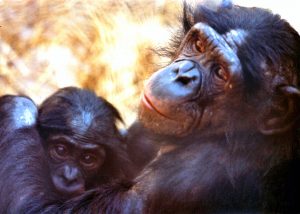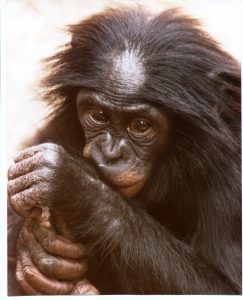
By Steve Runfeldt, Minnesota
During my first phase of graduate school, I studied how bonobos communicate and vocalize. They are cousins of chimpanzees. My graduate-school professor, an expert on animal communication, had worked with renowned scientist and author Jane Goodall in the past. Dr. Goodall researched the similarities in behavior between animals and people. I’ve discovered a fascinating spiritual link between chimps and humans.
I transferred my graduate studies to a university where I worked with chimpanzees, bonobos, and orangutans, teaching them symbolic language and rudimentary computer skills. I soon learned that bonobos are very intelligent. One in particular, named Kanzi, understood hundreds, if not thousands, of spoken English words.
Those of us who worked on the animal-language project would form words and concepts by using a special keyboard with symbols on it. Kanzi would touch the keys to communicate back to us. I thought this was absolutely amazing.
Kanzi’s Practical Joke
The building where I worked was situated on sixty wooded acres with trails. My girlfriend, Liz, who also worked on the animal-language project, and I used to walk with the chimps on trails. We would ask the bonobos where they wanted to go. They would point at the symbol for one of about a dozen locations on the trails where special foods were kept.
Kanzi might ask to go to the tree house for bananas or to get some melon at the A-frame. Then he would lead us to his chosen destination. Along the way, we had conversations with him by using our special keyboard and sign language.
The campfire was a favorite spot for Kanzi. One day, we were sitting around the campfire—just two human beings and a chimp. I got an inner nudge to try a little experiment.
I said, “Kanzi, come here.”
Kanzi shuffled over to my side.
Without using the keyboard or symbols, I whispered in Kanzi’s ear, “Why don’t you get a piece of ice and stick it down Liz’s back?”
Kanzi looked at me thoughtfully and got very quiet. Then he moved outside our campfire circle, sauntered over to the cooler, and opened it. Liz had heard my request to Kanzi but must have sensed this would be an interesting experiment. She sat still and didn’t say anything.
Kanzi reached his hand into the cooler. Then he circled behind where Liz and I sat, slyly looking in the opposite direction. Distractedly, as if he wasn’t paying attention to her, he slowly walked around the outside of the circle, until he was directly behind Liz, at a short distance. Suddenly he darted forward and shoved the piece of ice he’d plucked from the cooler down the back of her shirt.
Exceedingly pleased with his practical joke, he jumped into a nearby tree and started his distinctive, guttural, bonobo laugh as he enjoyed watching our reactions.
As much as I knew about bonobos and their capabilities, it surprised me that Kanzi had completely understood the social situation, the language, and our shared joke. With a human doing the setup, he had flawlessly followed through on the delivery. Even though Kanzi is a chimpanzee, he had planned his actions, laughed, and made a quick exit. His behaviors showed that he knew what he’d done was funny but likely to get him into some trouble.
Now I had witnessed Kanzi’s joke on Liz mimicking what people might do to one another. Were there other situations in which human and chimp behaviors were the same?
Why Do Chimps Sing HU?
A few years after Kanzi’s display of conscious awareness, I was telling a friend about my study of Eckankar. I mentioned its teachings on the benefits of singing HU, an ancient and sacred sound that can be heard within all creation. Then I remembered something I had learned during my work with chimpanzees.
 I pulled out the published book Jane Goodall had asked my professor to review, The Chimpanzees of Gombe: Patterns of Behavior. On the page facing the citation with the change we had suggested, I found a passage Dr. Goodall had written. She had observed chimps making a sound she called “the huu of puzzlement, surprise, or slight anxiety.” Chimpanzees sing “huu” repeatedly when they’re a little frightened. It seems to calm them. They sing “huu,” even when alone, if they enter a clearing, hear rustling in the bushes, and don’t know what it is.
I pulled out the published book Jane Goodall had asked my professor to review, The Chimpanzees of Gombe: Patterns of Behavior. On the page facing the citation with the change we had suggested, I found a passage Dr. Goodall had written. She had observed chimps making a sound she called “the huu of puzzlement, surprise, or slight anxiety.” Chimpanzees sing “huu” repeatedly when they’re a little frightened. It seems to calm them. They sing “huu,” even when alone, if they enter a clearing, hear rustling in the bushes, and don’t know what it is.
And I thought, Isn’t that amazing? Chimps sing HU in some of the same kind of situations I do. How many times had I sung the HU for protection after a close call with my car or before doing something frightening to me, such as speaking before a group of people?
I have found to be true what Sri Harold Klemp writes in his book, Animals Are Souls Too!:
Some human beings think animals are so low on the scale of life that they could not possibly provide a suitable embodiment for Soul. But in Eckankar we know that animals are SoulsSinging
.
And since they are Soul, they too need the love that HU can bring.
—Photos by Steve Runfeldt

So uplifting. Wonderful to think our cousins from the animal kingdom sing the HU, too.
So wonderful! Thank you for sharing.
Thank you for sharing your wonderful story.
Thank you, Steve. Your writing this story is inspiring and expands the gifts of your other stories your studies have shared.
This aspect of our primate cousins using the love song of huuu when they are anxious or simply uncertain is a definite relevance to what we as humans are discovering , too. Thankfully we have the teachings of ECKANKAR to remind us of our own namesake: human being.
God’s name first and the reference we use for our physical body second. And how many other of the life forms on this planet also comfort their yound with their singing their love to their young and each other?
Love definitely is the soother of uncertainty and fear.
Thank you, Steve, for expanding your gift of sharing your interactive studies with very intelligent and loving
Singers of hu.
I have only just got around to reading these current stories and I am so glad I did for this is a truly wonderful and incredible insight into the animal kingdom. Thank you so much Steve.
I love this story. Thank you for sharing it.
I adopted a lab pup when she was about 3 months old. The first time I sang HU with her in the house, I was sitting on the floor. After a short time I heard another HU in the room. It sounded more like, “RRRRRUUUUU”. I opened my eyes to see her looking directly at my mouth and doing her best to get her lips into a rounded shape like mine.
That is beautiful! Thanks for sharing.
What a beautiful story! Amazing!
I just LOVE these stories! I look forward to Animals are Soul Too when it arrives in my in box and read each story beginning to end. THANK YOU, SRI HAROLD, for coming up with this collection idea. IT ROCKS!
What a beautiful and amazing story! Thank you, Steve for sharing. I know all animals are Soul as they prove it to us in so many ways, but this is tops! Blessings.
Steve, thank you for sharing that incredible story!
I have seen the HU help so many people and my dogs love to watch me when I sing it. But for the chimps to sing it on their own, unmotivated by humans, makes me freeze in awe. And there it is in writing from someone who observed this protective action many years ago, wow!
I do have to mention the cat I knew in Mansfield, Ohio, who sang HU whenever she heard it. She would chime in her high pitch for 20-30 minutes, for as long as someone was singing it, her humans or anyone else. I know it’s hard to imagine, but I witnessed it.
I smiled throughout this story. Thank you Steve.
Steve, great story. Too bad you didn’t film It. I wonder if Jane taped or filmed her subjects singing the HU.
What an amazing, uplifting and delightful story! Thanks for sharing your personal experience with Kanzi and the discovery about “huu.” We “humans” still have so much to learn about our animal friends. The photos you shared are wonderful, too.